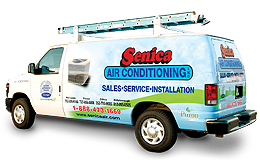 Compared to most of the rest of the country, Florida has it easy when it comes to its fall and winter climate. But that doesn’t mean you don’t still need to run your HVAC system sometimes to keep your house comfortable when things get cooler. And because of that, you can also still end up wasting both energy and money trying to warm your home if you’re not careful. So here are a few fall and winter energy-saving tips to help get you through this heating season with your wallet intact.
Compared to most of the rest of the country, Florida has it easy when it comes to its fall and winter climate. But that doesn’t mean you don’t still need to run your HVAC system sometimes to keep your house comfortable when things get cooler. And because of that, you can also still end up wasting both energy and money trying to warm your home if you’re not careful. So here are a few fall and winter energy-saving tips to help get you through this heating season with your wallet intact.
Fall and Winter Energy-Saving Tips for Your HVAC System
- Annual HVAC Maintenance. The first thing to do is to schedule your fall HVAC maintenance visit. It’s important to get your furnace or heat pump checked and serviced every year before heating season begins. That way, your HVAC maintenance technician can check the components, make sure everything is in working order, and fix any problems before they start to cost you.
- Duct sealing. So your HVAC system is in good shape and running as efficiently as possible. But how much of the air from the system is actually reaching its intended destination in your home? If your ductwork has tears, holes or other damage, or if two sections have come apart from each other, much of the air traveling through will leak out before it can be circulated through your house. With less air, it will take longer to heat your home to its ideal temperature, forcing the system to run longer and waste energy. Inspect your ductwork carefully for leaks and repair them with metal tape or mastic sealant.
- Change your air filter. Your HVAC system’s air filter should be replaced regularly. Check it once a month to see if it’s clogged, and replace it at least every three months. If the filter is white, and light can shine through it, it’s still usable. But if it’s opaque, and dark gray with dust and debris, it needs to be replaced. A clogged filter impedes airflow through your system, wasting energy, as well as increasing the amount of dust and other contaminants in your air.
- Check Your Thermostat. If you lower your thermostat by just a few degrees, it can save a significant amount of energy. Your home doesn’t need to be 75 degrees to be comfortable in the winter. Instead, keep it at around 68. You should also invest in a programmable thermostat. That way, you can keep your home warm and comfortable while everyone is at home, but switch to a lower, reduced energy setting during the day when the kids are at school and mom and dad go to work. You can also use the energy-saving setting at night when you go to bed, to minimize the time your HVAC system is in use.
Fall and Winter Energy-Saving Tips Around the Home
Your HVAC system isn’t the only place you can save energy this heating season. There are a number of fall and winter energy-saving tips that can be applied to other areas of your home. For instance…
- Use windows. You can reduce the need to run your furnace or heat pump by heating your home naturally. Open the curtains on the south side of your house during the day, allowing the sunlight into your home to warm it up. But be sure to close the curtains again at night. The glass will get colder more quickly than the walls, and can make the rest of the house colder as well. Closing the curtains will help reduce this.
- Reduce water heater energy use. Most water heaters are set much higher than they need to be. Not only does this waste energy; it can also be dangerous, causing unexpected burns and scalding. Turn your water heater’s temperature down to 120 degrees, and you’ll save a significant amount of energy.
- Replace your light bulbs. In the fall and winter, not only does the weather get colder, it also gets dark earlier. This means you’ll be leaving your lights on longer and using more energy. To offset this, replace any incandescent bulbs with CFL or LED bulbs. They provide the same amount of light for far less energy, and last much longer. For the outside of your home, use halogen lamps, and install a motion sensor. That way, the lights only turn on when someone is there, rather than staying on all night.
For more fall and winter energy-saving tips for your Tampa-Clearwater-St. Pete home, contact our experts at Senica Air Conditioning, Inc., Inc. today.
Image Provided by Shutterstock.com



